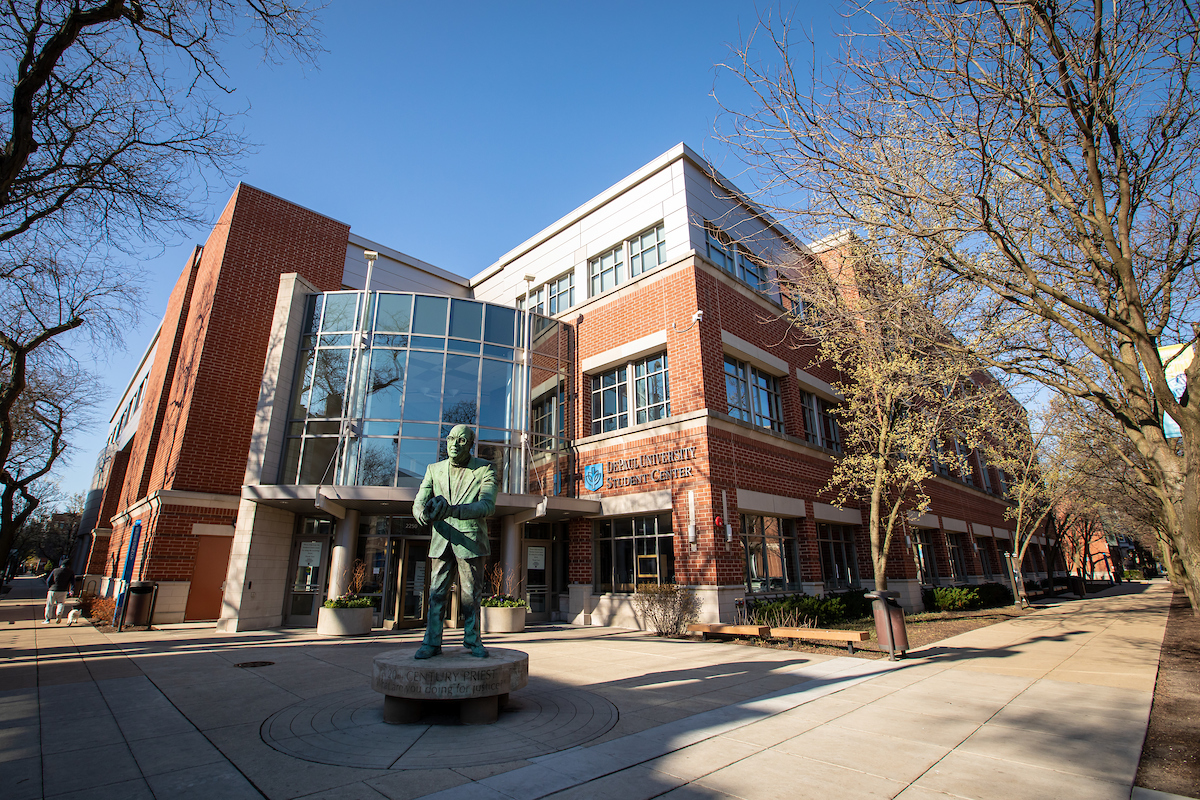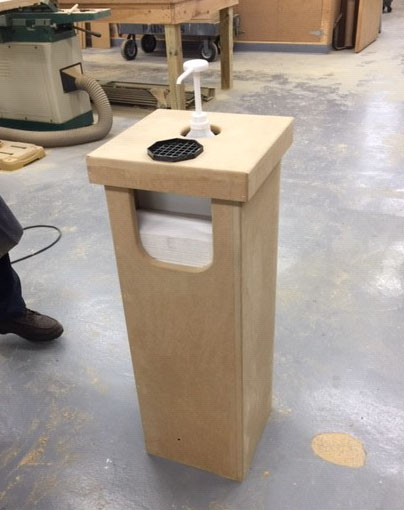 (DePaul University/Jeff Carrion)
(DePaul University/Jeff Carrion)
DePaul's Facility Operations staff is prioritizing safety, sanitizing and social distancing measures in their plans to prepare the Loop and Lincoln Park campuses for fall.
Over the past months, the university has invested heavily in COVID-19 supplies, response equipment and sanitizing tools. The following article details DePaul's COVID-19 precautions for campus buildings thus far as the university continues its preparations for fall. Some measures already have been put in place while others are in progress. In-depth information on residence halls will be shared at a later date.
As the start of the academic year approaches, Facility Operations will be available to provide consultation to departments, centers and institutes on request as they develop workspace modifications and protocols for return to in-person work.
General cleaning and sanitizing
While the schedule is yet to be determined, DePaul will reduce building hours to provide time for additional cleaning and sanitizing prior to the following day.
Elevator buttons, handrails and other high-touch surfaces will be cleaned as often as feasible. Facility Operations will provide door wedges and/or remove any doors (except fire doors) in office suites to eliminate unnecessary high-touch surfaces. Units will be encouraged to prop open entry doors when and where possible during business hours to reduce hardware touch points. Kitchen and break rooms will be cleaned each night by building cleaning crews.
 DePaul is installing up to 700 hand sanitizer stations throughout both campuses. The stations include paper towel dispensers. (DePaul University/Rob Bloom)
DePaul is installing up to 700 hand sanitizer stations throughout both campuses. The stations include paper towel dispensers. (DePaul University/Rob Bloom)
Measures for Classrooms
Facility Operations, in conjunction with Information Services, will manage the upgrading of technology equipment in 110 classrooms across the university in an effort to facilitate various combinations of on-site and online learning.
Classroom occupancy will be reduced and tables and chairs will be removed or stacked in the back of rooms to promote proper social distancing. Classroom tables and seating will be sanitized between each class.
Computers and other equipment will be covered or removed as appropriate and necessary from computer labs and other labs to promote proper social distancing in those spaces. While it is up to the leadership teams supervising those spaces to determine what equipment is to be taken offline, Facility Operations will provide assistance, as needed, when it comes time to remove those items.
Computer labs and special equipment in other types of labs will be sanitized each evening and as often as feasible during the day. In addition, hand sanitizer and paper towels will be provided in all labs.
Public Restrooms
Restrooms will be cleaned several times each day. Facility Operations' custodial teams are currently surveying every restroom at the university to identify those with layouts suitable for entry door propping without sacrificing personal privacy. Any such suitable restroom doors will be propped open during business hours to limit the need for touching door handles.
Access to sanitizing products
Up to 700 hand sanitizer stations will be installed throughout office suites, cafeterias, libraries, recreation facilities, in every computer laboratory and in the common areas of each building. Each station will be fitted with a one-gallon bottle of World Health Organization-formula liquid hand sanitizer.
The stations are designed with an integrated multi-fold paper towel holder. People in these areas can put one or two pumps of the liquid hand sanitizer on a paper towel and then use the saturated paper towel to effectively disinfect their immediate working area. Paper towels and hand sanitizer stations will be checked at least daily and restocked as needed.
For delicate surfaces, which might be damaged by WHO-formula hand sanitizer (such as fine woodwork and musical instruments), Facility Operations will provide a limited stock of commercial disinfectant wipes.
Improved air filtration
All HVAC filters in residence halls will be upgraded from MERV-8 to MERV-13 specifically with the aim of reducing potential airborne virus matter. All filters in other DePaul buildings will be similarly upgraded at the next scheduled filter change interval. Considerations are under discussion for improved air filtration in the DePaul offices in 55 E. Jackson Blvd.
As often as possible, DePaul will bring in at least twice the code minimum requirement of outside air into every building that is equipped to do so.
All HVAC systems will run a minimum of four additional hours each day (two hours before occupancy and two hours after occupancy). Running the systems early in the morning, before the buildings open, will help dilute and filter any residual virus matter that may have survived the night cleaning operation.
Plexiglass shields
Facilities is establishing a plan to install plexiglass shields at all front-line reception and intake desks, and front-facing information and work counters before the academic year begins. Some shields already have been installed.
Measures for public spaces
The number of lounge and general seating furnishings will be reduced to promote distancing. Facility Operations staff already has been applying these measures at all buildings. Removal has begun on couches and other multi-person seating in common areas of academic buildings. Additional chairs will be removed from group tables, and tables will be spaced to the extent possible. Removal of multi-person outdoor seating also has begun at both campuses, including benches in the Loop Campus and picnic tables in the Quad.
The university is still working on guidance on elevator and stairwell protocol, cafeterias and dining facilities.
Cleaning tools for cases of COVID-19
If there is a confirmed case of COVID-19, Facility Operations is establishing options on both campuses for disinfecting spaces of various sizes and configurations. The tools being procured include:
- Hospital-grade disinfectant
- Hospital-quality UV-C light machine rated to kill 99.9 percent of all virus material
- Clorox 360 electrostatic chemical application machine
Read past articles on restarting campus operations: